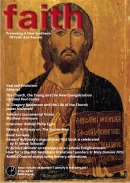
God and Evolution – the fundamental issue today
The decline of Christian belief in the West is accelerating – last year a survey revealed that for the first time less than 50% of people in the U.K. now identify as Christians. And those brought up as Catholics are not exempt from this loss of faith. Why is this happening?
The fundamental issue is that ‘scientific’ atheism, now popularised by writers such as Richard Dawkins, has gained intellectual ascendancy in our culture. Yet little official Church teaching has engaged with its arguments in a detailed and coherent way. The documents of Vatican II had many beautiful things to say, but they did not engage intellectually with atheism. The Church seemed to have accepted that the old arguments for the existence of God had been demolished by science, and it appeared that nobody had any new reasoned approaches to take. So in the decades following the Council, the old scholastic approach disappeared from seminaries; catechesis abandoned any element of reasoned apologetics and became experience-based. God was ‘given’; his existence could not be argued for, much less demonstrated.
Liberalism vs. fundamentalism
In this intellectual vacuum, a dichotomy has appeared. On the one hand, there is the liberal Christian who has abandoned traditional doctrine and barely seems to believe in God – certainly not in the divinity of Christ. The late Anglican Bishop of Durham, David Jenkins, became the best known of these. They have a following among a liberal elite, but their churches have emptied fastest of all. On the other hand, religious fundamentalism of the most bible-thumping, anti-intellectual kind has become identified in the public mind with mainstream Christian belief. If you’re religious, this is the sort of nutter you are, at least according to the media. This, of course, is greatly to atheists’ and secularists’ advantage.
Evolution
Evolution – the paradigm through which we understand all science – is the crunch issue. If Christians can apparently only maintain their full faith by rejecting evolution, then they have obviously lost the debate. A disturbing feature of recent decades is that whereas such anti-science fundamentalism was previously only to be found
in simplistic ‘Bible belt’ churches, it can now be heard even from some Catholics. A package has emerged in some circles in which rejection of evolution is a badge of " traditionalism’. Our atheist opponents could not have wished for better confirmation of Catholicism’s decline into a weird, anti-intellectual sect. Such fundamentalism is an intellectual dead end.
It is not, of course, the authentic Catholic tradition. From St Paul arguing that we can know God from ‘the things he has made’, to Aquinas’s monumental synthesising of theology with Aristotelian thought, through to Canon Nicholas Copernicus’s breakthrough about the shape of the cosmos, to Friar Gregor Mendel’s discovery of the laws of genetics, to Père George Lemaitre’s theory of the Big Bang – Catholic intellectuals have brought faith and science together. Pope St John Paul II’s encyclical Fides et Ratio (believed to be largely drafted by Joseph Ratzinger) made an appeal for this tradition to continue, but it has to be said that there has been little response.
The need for intellectual argument
The issue must be addressed. We cannot go on talking about God to an audience who think he has been disproved. It is no good our going on about Scripture if our audience thinks it has been shown to be no truer than the myths of other religions.
We can’t escape the need for intellectual argument. Any RE teacher who tries to explain the Faith to teenagers knows this. You can be as ‘green’ and as enthusiastic about ‘justice and peace’ as you like – for an atheist teenager this is just icing on a non-existent cake. After all, you can be very committed to all these social issues without having to believe in God. In fact the Church can look as if it’s just jumping, belatedly, on a green or liberal political bandwagon. God is not reducible to social issues, no matter how worthy, and if we give the impression that these are all our faith is about, we are tacitly accepting that we’ve lost the intellectual argument about whether He exists at all.
Of course, you can’t argue someone into belief if they don’t want to believe. But there are many youngsters who have been brought up in the Faith but who in adolescence are overwhelmed by the atheist intellectual atmosphere of our times and who begin to assume that you can’t have a modern scientific outlook and also be a Catholic - that God cannot be demonstrated to exist at all. It is to them that we can and must present the Faith in a way that is intellectually coherent – above all, not embarrassed or intimidated by the philosophy of science, but embracing it, using it to show the truth and beauty of our religion. Jesus is the One through whom and for whom the universe was made. He is not just another great soul in the history of world religions – he is the centre of all history, giving meaning to it all and to us. We must be able to explain creation, revelation and the Incarnation and Redemption in one coherent sweep of meaning, in which the Church, despite the many sins and failings of its members, is the continuing teacher of the truth for all the nations.
A new synthesis
Fr Edward Holloway (1918-99), meditating on his mother’s intuitions - she would say, inspirations - developed just such a theology. He was unsparing in his criticisms of the dry scholasticism taught in the seminaries of his day because it ignored how modern science had changed philosophy. His bishop told him he was a modernist, and despite his formidable intellectual gifts he was never allowed any academic or intellectual position in the Church. Then, in the cultural and intellectual revolution of the post-conciliar years, he was seen as a conservative because he criticised the liberal theology and catechetics that now became dominant, and he warned that influential voices in the Church were failing to teach the full, orthodox doctrine and morality of Catholicism. As the years go on, and the Church continues to flounder in the West and to be split over fundamental questions of morality, Fr Holloway can be seen as a prophetic voice, whose message is becoming more and more urgent if we are not to lose the battle with atheism completely.
The Faith Movement
The Faith Movement Fr Holloway founded has continued to promote his ‘line’ through this magazine, through our pamphlets and website and, most importantly of all, through our formation of young people through our Summer and Winter Sessions and other events. The many priestly vocations the movement has produced are evidence of its effectiveness. With this issue we launch a ‘new’ Holloway text, Matter and Mind: A Christian Synthesis
It was his first attempt to write up his vision as a single book. Written in his first years as a priest in the late 1940s, it has freshness and urgency, though already authoritative and assured in tone. This first book was never published, and Fr Holloway later decided to rewrite it completely as Catholicism – A New Synthesis which he published in 1969 and for which he is best known today.
Matter and Mind is reviewed in our Book Reviews pages by Fr James Tolhurst who comments that it ‘has an immediacy and a conciseness to differentiate it from the final, more elaborate version twenty years later.’ We also publish a brief extract from it in our ‘Holloway on …’ section – though extracts can hardly do justice to the breadth of the book’s vision.
Importance
Fr Roger Nesbitt, another of the young priests Fr Holloway influenced and who was to become his chief collaborator and the co-founder of the Faith Movement, has edited this text for publication. As he writes in his Introduction, ‘We are now publishing this edition of Matter and Mind: A Christian Synthesis in the hope that it will help many more to understand the vital importance of the vision Fr Holloway has given to us.’
Fr Holloway himself boldly wrote that ‘the basic principles which underlie this work … give to the Church the new key she needs to unlock a deeper treasure vault of the deposit of the Faith, and to bring forth from its depths new things and old for the salvation of men’. He would have been the first to acknowledge that others could and would write more and better on this, the great issue of our age. But who else is doing this? May Our Lord who is Wisdom, and who renews the Church in every age, help this prophetic voice to be heard.
Notes:
Editor

